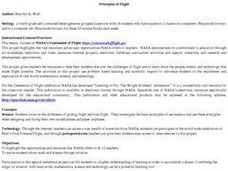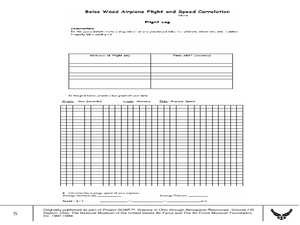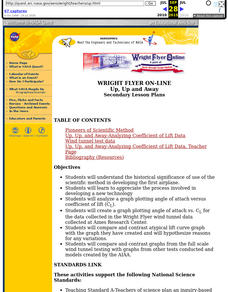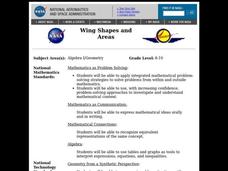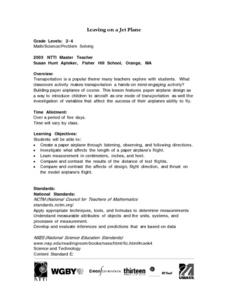Curated OER
Dayna Lykins, Leanna Prater
Fourth graders compare and contrast gliding flight and true flight. They investigate the basic principles of aeronautics. The class participates in activities to observe lift and the effect of air. Students design and fly their own...
Curated OER
The KAO Telescope
Students explore the basic principles of the operation of the NASA's KAO telescope. They construct a simplified model of it using film canisters and other everyday objects. Step by step directions are included in plan.
Curated OER
Balsa Wood Airplane Flight and Speed Correlation
Ninth graders calculate the average speed of their balsa wood airplane. In this physics lesson, 9th graders build their own airplane and make necessary modifications to to make it fly straight. They interpret distance and time graph...
Curated OER
Forces in a Climb
Learners use a NASA website to use a given formula to find acceleration and distance after a specific time and how it relates to engine propulsion.
Curated OER
Untitled Document Aerospace Team Online:
Students explain the historical significance of use of the scientific method in developing the first airplane and appreciate the process involved in developing a new technology.
Curated OER
Wright Flight
Young scholars explain and explain the interactive relationships between forces of lift and gravity, thrust and drag, as they apply to airplanes in motion. They know that Orville and Wilbur Wright flew the first airplane based on these...
Curated OER
Wing Shapes and Areas
Students, after reading the explanation given below, use FoilSim to determine the weight of the aircraft that can be lifted by a pair of wings of each type. They also design a unique platform of a wing to lift a plane weighing 11500 pounds.
Curated OER
Perpetual Motion
Students discuss movement of air currents and then experiment to create visible models of air currents. Students connect the model to weather patterns.
Curated OER
CHARTING A COURSE
Students model how a gyroscope works with string, an old phonograph record and crayon.
Scholastic
Drones Take Off
Ever wonder what drones are doing high above us in the sky? This article gives your class an insight to what those robots in the sky are doing. After reading an article on drone technology, pupils are prompted to respond to a variety of...
Curated OER
Build Your Own Parachute
Students study the basics of parachuting. In this flight and aerodynamics lesson students make a simple parachute and investigate different variables that can cause potential problems.
Curated OER
Water and Ice
Students study the liquid and solid states of water. In this water states lesson plan, students complete three experiments to study water as it cycles from a liquid state to a solid state and back. Students finish with a Venn Diagram...
Curated OER
Water Rocket
Students study the basic operation of a water rocket. In this propulsioninstructional activity students complete several experiments on constructing a bottle rocket launcher.
Curated OER
Through Time: Change in Sedona
Pupils locate events on a timeline of Sedona, Arizona and describe human and physical characteristics of the city. In this Sedona lesson plan, students locate the city on a map and listen to stories about Sedona.
Curated OER
Leaving on A Jet Plane
Students create an airplane by listening to directions. They also to measure the pieces for the airplane and compare and contrast their test flights.
Curated OER
History of Flight Timeline Activity
Scholars are introduced to the significant events that led to the development of today's modern forms of air travel. They create a timeline to identify the vital events that are related to man's flight. In addition, they research various...
Kenan Fellows
Reading Airline Maintenance Graphs
Airline mechanics must be precise, or the consequences could be deadly. Their target ranges alter with changes in temperature and pressure. When preparing an airplane for flight, you must read a maintenance graph. The second lesson plan...
Curated OER
The Roaring Twenties
Let's take a look back at America during the 1920s and 1930s. Information regarding the economics in the 1920s that led to some of the issues during the 1930s are covered using text and images. Learners will consider economic booms,...
Institute of Electrical and Electronics Engineers
Wind Tunnel Testing
One of the factors that automotive engineers must consider is wind drag. The less wind drag, the more efficient the car will be. They perform many tests in wind tunnels, then refine their designs and test again. Using simple materials,...
Perkins School for the Blind
Design and Problem Solving
What if you had a design problem you wanted to solve, but were unable to draw because you were unable to see? Teach your learners with visual impairments that they can use Wikki Stix®, a braille ruler, Legos®, and Constructo Straws to...
Cornell University
Plant Cell Crime Scene
Use science to solve the mystery of the Poplar murder. Pupils use forensic botany to determine if a suspect could be the killer. By analyzing images from a Transmission Electron Microscope, learners determine if the material found on the...
Curated OER
It's Raining, It's Pouring: The Water Cycle
Middle schoolers investigate the relationship of the steps in the water cycle, and create a simulation of the water cycle in a jar.
Teach Engineering
Egg-cellent Landing
The classic egg-drop experiment gets a new bounce with an activity that asks pairs to design a lander similar to one used to land a rover on Mars within a fixed budget. The activity provides a great introduction to the idea of terminal...
Curated OER
Radiation Comparison Before and After 9-11
Using the NASA website, class members try to determine if changes could be detected in cloud cover, temperature, and/or radiation measurements due to the lack of contrails that resulted from the halt in air traffic after the attacks of...


